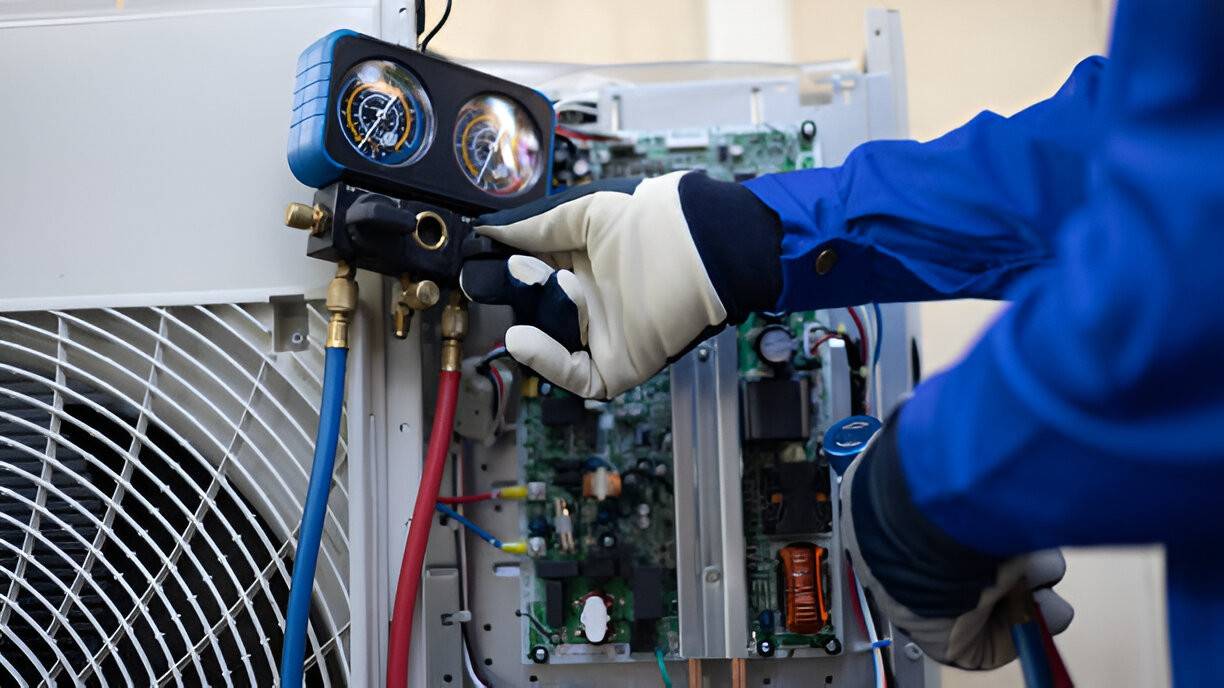AC Tune-Up in Gibsonton, FL


Why an AC tune-up matters in Gibsonton, FL
Gibsonton’s hot, humid climate drives heavy cooling loads for most of the year. That combined with salty coastal air and frequent storms increases corrosion risk and can accelerate wear on outdoor units. Regular tune-ups:
- Reduce energy bills by restoring efficiency lost to dirt, leaks, or worn parts
- Improve indoor comfort by ensuring consistent airflow and proper cooling capacity
- Prevent costly emergency repairs during peak demand season
- Help preserve equipment life and may support manufacturer warranty requirements
Common AC problems in Gibsonton homes
- Reduced cooling capacity and long run times from dirty coils or clogged filters
- Low airflow caused by blocked ducts, failing blower motors, or dirty evaporator coils
- Refrigerant leaks or incorrect refrigerant charge after decades of use
- Corroded or sticky contactors and failing capacitors from salt air exposure
- Clogged condensate drains that lead to water damage or system shutdown
- Thermostat miscalibration or poor placement causing short cycling or uneven temperatures
Typical AC tune-up checklist
A professional tune-up follows a systematic checklist to restore performance and identify issues before they become failures. Typical items include:
- Inspect system visually for corrosion, physical damage, and proper installation
- Clean outdoor condenser coils and straighten bent fins
- Clean or replace indoor evaporator coil access panels and inspect coil condition
- Check and replace air filters as needed to restore proper airflow
- Inspect and clear condensate drain and pan; verify drain line flow
- Test refrigerant level and check for signs of leaks (no refrigerant is added unless a leak is found and repaired)
- Test capacitors, contactors, relays, and electrical connections for wear or heat damage
- Measure blower motor operation and fan speeds; lubricate motors and bearings when serviceable
- Verify thermostat calibration and setpoint accuracy; check wiring and placement
- Assess ductwork integrity and measure static pressure to evaluate airflow performance
- Measure system performance: return vs. supply temperature split, runtime, and overall cycling behavior
- Check safety controls and system startup/shutdown sequences
- Provide a written summary of findings and recommended repairs or parts replacements
What the technician will diagnose and why it matters
- Coil cleanliness: Dirty coils act like insulation, reducing heat transfer and forcing the compressor to work harder. In Gibsonton’s humid environment, coils can quickly accumulate grime and biological growth that limit cooling.
- Refrigerant condition: Both overcharge and undercharge reduce efficiency. Low refrigerant almost always indicates a leak that needs repair.
- Electrical components: Failing capacitors and contactors are common causes of sudden non-starts. Salt and heat degrade electrical parts faster in coastal Florida.
- Airflow and duct performance: Restricted airflow increases energy use and can cause freeze-ups. Leaky ducts in attics or crawlspaces waste cooled air into hot spaces.
- Drainage: Blocked condensate drains cause water backup, potential microbial growth, and safety switch trips that shut the system down.
Typical duration and what affects service time
Most comprehensive residential AC tune-ups take about 60 to 90 minutes for a standard split system. Factors that extend duration:
- Extensive cleaning needed for severely dirty coils or heavily corroded outdoor units
- Time required to access attic ductwork or hard-to-reach components
- Additional diagnostics if electrical tests show intermittent failures
- Repairing leaks or replacing major components (these will add time and require a follow-up visit in many cases)
Expected outcomes and efficiency benefits
After a proper tune-up you should notice:
- Better cooling performance and steadier indoor temperatures
- Shorter run times and improved system responsiveness
- Lower energy consumption compared with a neglected system
- Quieter operation and reduced risk of unexpected failures
- Improved indoor air quality when filters and drain pans are addressed
Seasonal tune-ups can preserve compressor life and help systems maintain rated efficiency. In coastal and humid areas like Gibsonton, keeping coils and electrical parts clean and corrosion-free directly extends component life.
Recommended schedule for Gibsonton homeowners
- At minimum, schedule an annual spring tune-up before the cooling season intensifies.
- Consider biannual service (spring and late fall) if your system runs heavily year-round, if you have older equipment, or if your home is close to the bay where salt air exposure is greater.
- Replace filters more frequently during pollen season and when household occupancy or pet activity increases.
Practical tips to get the most from a tune-up
- Keep the area around the outdoor unit clear of plants, debris, and stacked items to allow proper airflow.
- Change or check filters monthly during peak use months and replace according to manufacturer guidance.
- Note any irregular sounds, uneven cooling, or short cycling and report them during the service call.
- Keep thermostat settings and schedules consistent to make it easier to spot changes in performance.
A well-executed AC tune-up in Gibsonton, FL is an investment in comfort, reliability, and long-term operating cost control. Regular maintenance tailored to Gulf Coast conditions reduces downtime, protects components from accelerated corrosion, and helps your system perform efficiently when you need it most.
Service Areas


